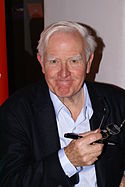John le Carre Quote
The embassy’s front door was of bulletproof steel lined with a veneer of English oak. You attained it by touching a button in a silent lift. The royal crest, in this air-conditioned stillness, suggested silicone and funeral parlours. The windows, like the doors, had been toughened to frustrate the Irish and tinted to frustrate the sun. Not a whisper of the real world penetrated. The silent traffic, cranes, shipping, old town and new town, the brigade of women in orange tunics gathering leaves along the central reservation of the Avenida Balboa, were mere specimens in Her Majesty’s inspection chamber. From the moment you set foot in British extraterritorial airspace, you were looking in, not out. —
John le Carre
The embassy’s front door was of bulletproof steel lined with a veneer of English oak. You attained it by touching a button in a silent lift. The royal crest, in this air-conditioned stillness, suggested silicone and funeral parlours. The windows, like the doors, had been toughened to frustrate the Irish and tinted to frustrate the sun. Not a whisper of the real world penetrated. The silent traffic, cranes, shipping, old town and new town, the brigade of women in orange tunics gathering leaves along the central reservation of the Avenida Balboa, were mere specimens in Her Majesty’s inspection chamber. From the moment you set foot in British extraterritorial airspace, you were looking in, not out. —
Related Quotes
About John le Carre
David John Moore Cornwell (19 October 1931 – 12 December 2020), better known by his pen name John le Carré ( lə-KARR-ay), was a British author, best known for his espionage novels, many of which were successfully adapted for film or television. A "sophisticated, morally ambiguous writer", he is considered one of the greatest novelists of the postwar era. During the 1950s and 1960s, he worked for both the Security Service (MI5) and the Secret Intelligence Service (MI6). Near the end of his life, due to his strong disapproval of Brexit, he took out Irish citizenship, which was possible due to his having an Irish grandparent.
Le Carré's third novel, The Spy Who Came in from the Cold (1963), became an international best-seller, was adapted as an award-winning film, and remains one of his best-known works. This success allowed him to leave MI6 to become a full-time author. His novels which have been adapted for film or television include The Looking Glass War (1965), Tinker Tailor Soldier Spy (1974, 2011), Smiley's People (1979), The Little Drummer Girl (1983), The Night Manager (1993), The Tailor of Panama (1996), The Constant Gardener (2001), A Most Wanted Man (2008) and Our Kind of Traitor (2010). Philip Roth said that A Perfect Spy (1986) was "the best English novel since the war".
Le Carré's third novel, The Spy Who Came in from the Cold (1963), became an international best-seller, was adapted as an award-winning film, and remains one of his best-known works. This success allowed him to leave MI6 to become a full-time author. His novels which have been adapted for film or television include The Looking Glass War (1965), Tinker Tailor Soldier Spy (1974, 2011), Smiley's People (1979), The Little Drummer Girl (1983), The Night Manager (1993), The Tailor of Panama (1996), The Constant Gardener (2001), A Most Wanted Man (2008) and Our Kind of Traitor (2010). Philip Roth said that A Perfect Spy (1986) was "the best English novel since the war".
